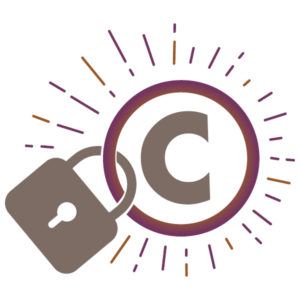PUBLISHED JANUARY/FEBRAURY 2021
by
MJ Courchesne, Founder & President, Gryphon Publishing Consulting --

Infringement and piracy will not go away, so it is important for you to learn what you can do if you find your work available online illegally.
Infringement and piracy remain big issues for publishers. A 2017 report from Nielsen Digimarc[1] estimated losses of $315 million in the book industry alone from online piracy. Pirated content is no longer only downloaded from torrent sites, but online auction sites, social media, and even emails can contain infringing content from your titles.
Is Your Work Protected?
Before we discuss how to fight infringement and piracy, we should review the basics of copyright. Copyright is defined in US law[2] and is meant to protect works of original authorship. These works comprise of books, musical compositions, photos, drawings, and more.
Basically, the copyright owner is the individual who created the work (unless rights have been transferred to another individual or company via a contract like a work-for-hire[3] agreement). Although a creator has automatic copyright of their work, as soon as it is placed in a fixed format like a book, the work should be registered with the US Copyright Office to further protect it.
Without registration, you cannot take legal action against an infringer. Registration allows the copyright owner to file an infringement suit in US courts, and it creates evidence of the validity of the copyright. It provides several other benefits we can’t go into here, but you can learn more about by visiting the Copyright Office’s website.
What Is Infringement?
Once you have a registered copyright, you can better defend it against infringers (including pirates) worldwide. But when is something infringed? Essentially, whenever any of the rights of the copyright holder are violated (no matter the country of origin), an infringement occurs. This means that any quote, crop, derivative, distribution, or translation of a work that was not formally licensed could be considered an infringement. Something as simple as a quote from a poem or song that was the “heart” of a work might be an infringement. Of course, it also means that a full-length, illegally obtained copy of a book (a “pirated” copy) is an infringement.
Reuse of a work without permission is sometimes allowed under the concept of fair use. We don’t have the space to review fair use here completely, but keep in mind that fair use is usually used in things like reviews, parody, news reporting, and education.
How to Remove Illegally Posted Content

The Digital Millennium Copyright Act (DMCA) is an amendment to the US copyright law. Similar laws exist globally. In short, DMCA criminalizes copyright infringement online and provides a framework for removing infringing content.
Where would you find infringing content? Basically, there are two ways most pirated material appears on the internet. The most common is as links placed on digital platforms such as Google, WordPress, LinkedIn, SlideShare, etc. The other makes pirated material available on standalone websites (torrents), which can originate from any place in the world.
You could occasionally search for your content online or set up automated search alerts for your title or content. Sometimes your customers might stumble upon infringing content and let you know. Pirated material might be shared on social media or via web searches, too. But infringed content can exist on foreign websites with strange names or even hidden from plain sight on the dark web, so no one search method is exhaustive.
If, after you research, you still believe your work has been pirated, you can file a takedown notice to have the pirated work removed. You must first find the host site and file location of the pirated work. Then, go to the website of the platform (e.g., Google, Rapidgator, FileSonic, etc.) and click on the “Abuse” or “Report Abuse” link (or something similar). Some sites might require you to fill out a form. Others might have you send a DMCA takedown notice via email or paste it into a form.
Remember, most digital service providers require the copyright owner or a designated agent to submit a takedown request. In some cases, your contact information will be shared with the alleged copyright violator.
Whether you need to simply fill out a form or write a formal letter, you should expect to gather the following information to include with the takedown notice: name of the copyrighted work, name of the copyright owner, infringed material location, your contact information, affirmation that the work has been pirated, and a testament that you are the copyright owner or authorized agent. You can find examples of takedown notices at the US copyright office website.
What Are Your Options if the Work Is Not Removed?
Your first option is to accept the infringement and move on. (Yes, do nothing. There are costs of time and funding to consider before pursuing an infringer.) Your second option is to hire a copyright attorney to file a lawsuit. Copyright infringement is a federal offense. As such, suits must be brought forth within the federal court system, as well as in courts overseas. Again, the owner of the copyright must initiate the suit, or have their designated agent (or publisher) do so.
If you wish to hire an attorney, the best place to start is page 62 in your IBPA Member Benefits Handbook, which hosts a list of vetted attorneys, some of whom offer a discount to IBPA members.
Conclusion
Infringement and piracy will not go away, so it is important for you to learn what you can do if you find your work available online illegally. Now you have some familiarity with the terminology associated with infringement and what to do if faced with it. Stay tuned for our piracy guide, which will be published on the IBPA site in January; it will be a living document, updated with new tips as we learn them.
References
- Neilsen Digimarc report
- US Copyright Act
- Works made for hire
- How to register a work
- Benefits and importance of registering work
- Sample takedown notice and language
MJ Courchesne is a publishing veteran with more than 20 years of experience in trade, academic, and direct-response publishing and has spent nearly two decades specializing in licensing, subsidiary rights, and permissions. She is the founder and president of Gryphon Publishing Consulting and a member of the IBPA Advocacy Committee.